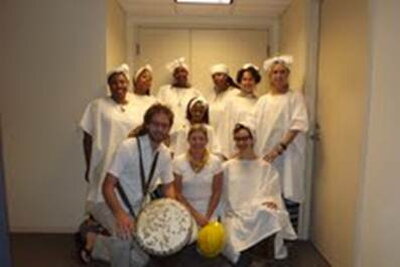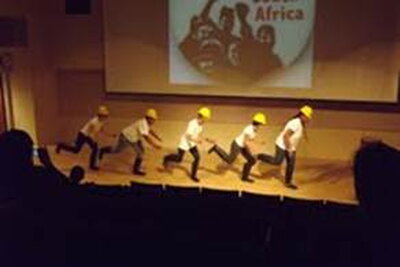
Introducing Jalimuso SiSWA
(from Amira Davis)

This past summer, I had the opportunity to teach several West African dance classes as a substitute for Guinean dancer, Djibril Camara. I’ve been a student of West African dance, drum, and culture since my years at the University of Missouri where I took my first dance class under the late founder of Chicago’s Muntu Dance Theater, Alyo Tolbert. Since that time I’ve studied and performed song, dance, shekere, and drums, from Africa and the Diaspora. I’ve intertwined this immersion in Africana culture with my academic, activist, spiritual, and community work. My doctoral study was an exploration of Africana feminist performance pedagogy and its transformative potential. Teaching the classes reignited my interest in creating this form of performance.
Several weeks after I taught the classes, I was contacted by the Spurlock Museum to do a performance and workshop related to their exhibit, World of Shoes. The director had heard that I did the South African Gumboot Dance and thought it would be a good example of dance that required shoes. I was also given the opportunity to do a dance without shoes. These events were the impetus for a new performance project, Jalimuso SiSWA.
Jalimuso is derived from the word for female storyteller among the people of Gambia, West Africa. SiSWA is an acronym for Sisters in Solidarity with Africa. Among the Mande speaking groups spread across West Africa, Jalimuso and Jelis (Griot in French) perpetuate oral traditions by retelling historical narratives of clans and luminaries through spoken word and song, accompanied by rhythm and dance.
The mission of Jalimuso SiSWA is to use African diasporic arts and culture to “tell the stories” of people of African descent. Performance as critical pedagogy is predicated on the concept of the circular nature of performance, most visible in African oral traditions of call and response. Preparation for the performance requires not only learning the songs and dance, but gaining historical and contemporary knowledge of Africa and her past and recent diaspora. The performers, in turn, translate this knowledge to audiences through embodied expression and conversation. It is in the liminal, ritual space of the performance stage that knowledge is shared, spirit is made manifest, and solidarity becomes possible. Jalimuso SiSWA resists the erasure, marginalization, and victimization of Black bodies.

The recent performances of the South African gumboot dance recall recent events at the Marikana Mines in which striking workers were killed by police. South African song and dance have been a part of my repertoire for many years as a means to symbolize solidarity with anti-apartheid struggles at home and abroad. The other dance selected was Lamban, the Dance of the Djeli from the Old Malian Empire. The dance was introduced by a brief history of Mali beginning with the reign of Mansa Musa through the current attack on the land and landmarks by extremists.
Jalimuso SiSWA is looking for women artists committed to political and cultural solidarity with people of African descent throughout the globe. If you’re interested, please contact Amira Davis at amira_davisatyahoo.com.
To view a delightful video of a Jalimuso SiSWA workshop visit: http://www.youtube.com/watch?v=v_UwL0eSTeE